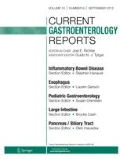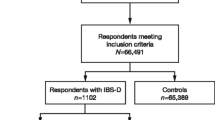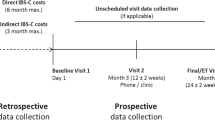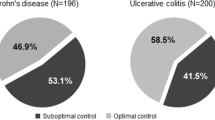Abstract
Irritable bowel syndrome (IBS) is a prevalent and expensive condition that significantly impairs health-related quality of life (HRQOL) and reduces work productivity. Based on strict criteria, 7% to 10% of people have IBS worldwide. Community-based data indicate that IBS-diarrhea and IBS-mixed subtypes are more prevalent than IBS-constipation, and that patients may switch among subtype groups. IBS is 1.5 times more common in women than in men, more common in lower socioeconomic groups, and more commonly diagnosed in patients younger than 50 years of age. Patients with IBS visit the doctor more frequently, use more diagnostic tests, consume more medications, miss more workdays, have lower work productivity, are hospitalized more frequently, and consume more overall direct costs than those without IBS. Resource utilization is highest in patients with severe symptoms and poor HRQOL. Treatment decisions should be tailored to the severity of each patient’s symptoms and HRQOL decrement.
Similar content being viewed by others
References and Recommended Reading
El-Serag HB, Olden K, Bjorkaman D: Health-related quality of life among persons with irritable bowel syndrome: a systematic review. Aliment Pharmacol Ther 2002, 16:1171–1185.
Gralnek IM, Hays RD, Kilbourne A, et al.: The impact of irritable bowel syndrome on health-related quality of life. Gastroenterology 2000, 119:654–660.
Saito YA, Schoenfeld P, Locke GR 3rd: The epidemiology of irritable bowel syndrome in North America: a systematic review. Am J Gastroenterol 2002, 97:1910–1915.
Systematic review on the management of irritable bowel syndrome in the European Union. Eur J Gastroenterol Hepatol 2007, 19(Suppl 1):S11–S37.
Saito YA, Talley NJ, Melton L, et al.: The effect of new diagnostic criteria for irritable bowel syndrome on community prevalence estimates. Neurogastroenterol Motil 2003, 15:687–694.
Andrews EB, Eaton SC, Hollis KA, et al.: Prevalence and demographics of irritable bowel syndrome: results from a large web-based survey. Aliment Pharmacol Ther 2005, 22:935–942.
Hungin AP, Chang L, Locke GR, et al.: Irritable bowel syndrome in the United States: prevalence, symptom patterns and impact. Aliment Pharamacol Ther 2005, 21:1365–1375.
Minocha A, Johnson WD, Abell TL, Wiginton WC: Prevalence, sociodemography, and quality of life of older versus younger patients with irritable bowel syndrome: a population-based study. Dig Dis Sci 2006, 51:446–453.
American College of Gastroenterology Functional Gastrointestinal Disorders Task Force: Evidence-based position statement on the management of irritable bowel syndrome in North America. Am J Gastroenterol 2002, 97:S1–S2.
Dunphy RC, Bridgwater L, Price DD, et al.: Visceral and cutaneous hypersensitivity in Persian Gulf war veterans with chronic gastrointestinal symptoms. Pain 2003, 102:79–85.
Gray GC, Reed RJ, Kaiser KS, et al.: Self-reported symptoms and medical conditions among 11,868 Gulf War-era veterans: the Seabee Health Study. Am J Epidemiol 2002, 155:1033–1044.
Hunt SC, Richardson RD: Chronic multisystem illness among Gulf War veterans. JAMA 1999, 282:327–328.
Miller V, Hopkins L, Whorwell P: Suicidal ideation in patients with irritable bowel syndrome. Clin Gastroenterol Hepatol 2004, 2:1064–1068.
Spiegel BMR, Schoenfeld P, Naliboff B: Prevalence of suicidal behavior in patients with chronic abdominal pain and irritable bowel syndrome: a systematic review. Aliment Pharmacol Ther 2007, 26:183–193.
Palsson OS, Jones KR, Turner MJ, et al.: Impact of somatization and comorbid medical conditions on health care utilization, disability, and quality of life in irritable bowel syndrome (IBS). Gastroenterology 2002, 122(Suppl 1):A501–A502.
Hahn B, Kirchdoerfer L, Fullerton S, Mayer E: Patient-perceived severity of irritable bowel syndrome in relation to symptoms, health resource utilization, and quality of life. Aliment Pharmacol Ther 1997, 11:553–559.
Naliboff BD, Balice G, Mayer EA: Psychosocial moderators of quality of life in irritable bowel syndrome. Eur J Surg Suppl 1998, 583:57–59.
Creed F, Ratcliffe J, Fernandez L, et al.: Health-related quality of life and health care costs in severe, refractory irritable bowel syndrome. Ann Intern Med 2001, 134:860–868.
Spiegel BM, Gralnek IM, Bolus R, et al.: Clinical determinants of health-related quality of life in patients with irritable bowel syndrome. Arch Intern Med 2004, 164:1773–1780.
van der Veek PP, van Rood YR, Masclee AA: Clinical trial: short- and long-term benefit of relaxation training for irritable bowel syndrome. Aliment Pharmacol Ther 2007, 26:943–952.
Shaw G, Srivastava ED, Sadlier M, et al.: Stress management for irritable bowel syndrome: a controlled trial. Digestion 1991, 50:36–42.
Spiegel BMR, Naliboff B, Mayer E, et al.: The effectiveness of a model physician-patient relationship versus usual care in irritable bowel syndrome: a randomized controlled trial. Gastroenterology 2006, 130:A773.
Spiegel BMR, Naliboff, Mayer E, et al.: Development and initial validation of a concise point-of-care IBS severity index: the 4-item “BEST” questionnaire. Gastroenterology 2006, 130:S1040.
American Gastroenterological Association: The Burden of Gastrointestinal Diseases. Bethesda, MD: American Gastroenterological Association Press; 2001.
Talley NJ, Gabriel SE, Harmsen WS, et al.: Medical costs in community subjects with irritable bowel syndrome. Gastroenterology 1995, 109:1736–1741.
Longstreth GF, Wilson A, Knight K, et al.: Irritable bowel syndrome, health care use, and costs: a U.S. managed care perspective. Am J Gastroenterol 2003, 98:600–607.
Longstreth GF, Yao JF: Irritable bowel syndrome and surgery: A multivariable analysis. Gastroenterology 2004, 126:1665–1673.
Lieberman DA, Holub J, Eisen G, et al.: Utilization of colonoscopy in the United States: results from a national consortium. Gastrointest Endosc 2005, 62:875–883.
Spiegel BMR, Gralnek IM, Bolus R, et al.: Is a negative colonoscopy associated with improved health-related quality of life or reassurance in irritable bowel syndrome? Gastrointest Endosc 2005, 62:892–899.
Whitehead WE, Palsson O, Jones KR: Systematic review of the comorbidity of irritable bowel syndrome with other disorders: what are the causes and implications? Gastroenterology 2002, 122:1140–1156.
Miller AR, North CS, Clouse RE, et al.: The association of irritable bowel syndrome and somatization disorder. Ann Clin Psychiatry 2001, 13:25–30.
Spiegel BMR, Kanwal F, Naliboff B, Mayer E: The impact of somatization on gastrointestinal health resource use in irritable bowel syndrome. Am J Gastroenterol 2005, 100:2262–2273.
Pare P, Gray J, Lam S, et al.: Health-related quality of life, work productivity, and health care resource utilization of subjects with irritable bowel syndrome: baseline results from LOGIC (Longitudinal Outcomes Study of Gastrointestinal Symptoms in Canada), a naturalistic study. Clin Ther 2006, 28:1726–1735.
Dean BB, Aquilar D, Barghout V, et al.: Impairment in work productivity and health-related quality of life in patients with IBS. Am J Manag Care 2005, 11:S17–S26.
Spiegel BMR, Harris L, Lucak S, et al.: Predictors of work productivity in irritable bowel syndrome (IBS): results from the PROOF cohort. Gastroenterology 2008, ABXX.
Author information
Authors and Affiliations
Corresponding author
Rights and permissions
About this article
Cite this article
Spiegel, B.M.R. The burden of IBS: Looking at metrics. Curr Gastroenterol Rep 11, 265–269 (2009). https://doi.org/10.1007/s11894-009-0039-x
Published:
Issue Date:
DOI: https://doi.org/10.1007/s11894-009-0039-x




